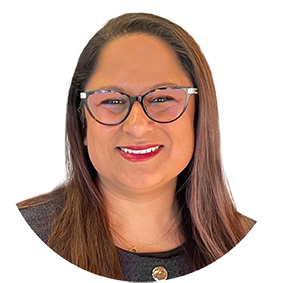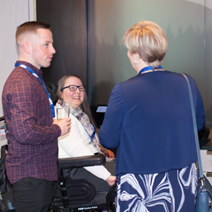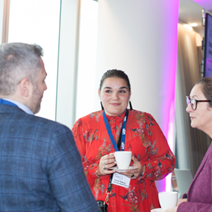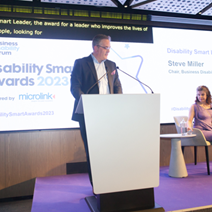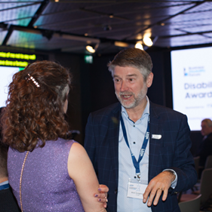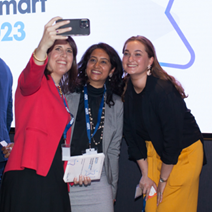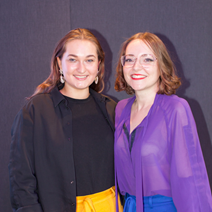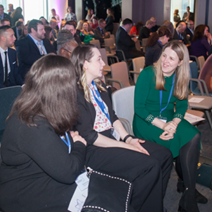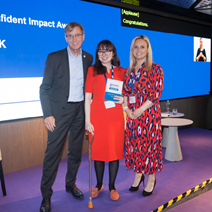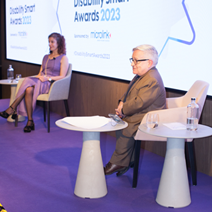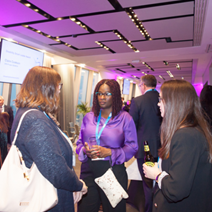Our people and our business
Spotlight on disability and neurodiversity
Disability and neurodiversity are key areas of focus for Freshfields, and they are gaining momentum both within the firm and externally. We have taken a number of steps to increase awareness, build an inclusive culture and make a positive impact for our disabled colleagues and the broader community in recent years.
From our partnership with the Business Disability Forum, involvement in the Valuable 500, to pro bono work, employee network led activity and training and review of processes, we are working with others to ensure this important priority gets the focus it needs. While there is still much more work to do, here we shine a spotlight on a few of the activities we have been involved in thus far.
Understanding workplace adjustments
We want to better understand our colleagues’ experiences and learning about adjustments that can be made to help everyone thrive is key to achieving this. Freshfields is a global partner with the Business Disability Forum (BDF) and, in 2022, we commissioned them to undertake an end-to-end review of our workplace adjustments process in the UK.
The process included working with a key stakeholder group (including colleagues from HR, health and safety, IT, our disability-focused employee network Enabled, and others) to understand current processes and highlight areas for improvement.
After a stakeholder workshop to gain insight on current practice (featuring a number of one-to-one interviews) and to review existing disability guidance, our initial findings were tested. A survey was sent to all UK colleagues to inform BDF’s review, and we had more than 450 anonymous responses. Along with stakeholder group feedback, it informed BDF’s recommendations.
‘It was great to see the commitment and collaboration of the multiple teams involved with the review,’ says Verity Smith, Diversity and Inclusion Advisor at Freshfields. ‘The insights gained from the review provide a solid foundation for us to make targeted interventions that help us become a more disability-friendly organisation.’
BDF’s comprehensive report made recommendations across six key areas: organisational commitment and culture, disability know-how and awareness, workplace adjustments, recruitment and retention, IT, and premises.
We are already making progress on several fronts including refreshing our adjustment policies and processes, reviewing our training provision, and ensuring our recruitment processes and assessments are fit for purpose.
We have also acted on BDF’s advice to promote trust, encourage open discussion, and raise disability awareness, especially for neurodivergent and other non-visible conditions. As recommended, we have been developing ‘a regular drumbeat of disability-related communication’ using multiple platforms.

Sometimes we need other people to come forward and share their story to feel confident about sharing our own experience of disability: we need to be the change that we want to see, to show others the art of the possible. This is one of the reasons why I decided to share my story – my disability story as well as that of my other intersectional identities relating to gender, race and ethnicity and social mobility – to show the next generation of lawyers that it is possible to thrive, succeed and progress as an openly disabled lawyer with multiple intersecting identities.
Neurodiversity awareness
The Enabled UK Neurodiversity Working Group was established in late 2022 by Laura Minnock (HR Manager, Co-Chair of the Enabled Network and Chair of the working group) and Reena Parmar (Counsel, previous Co-chair of the Enabled Network and Chair of the Law Society of England & Wales Disabled Solicitors Network). Its aim is to raise awareness, promote greater neuro-inclusivity and help nurture a sense of community in which neurodivergent colleagues are empowered to thrive.
The working group recently hosted a panel discussion on the theme of Supporting Neurodivergent Colleagues to Thrive. The panel spoke about their lived experience of having a neurodivergent condition, and the key strengths of and common obstacles faced by neurodivergent colleagues. The panel also provided insightful tips for both neurodivergent colleagues, as well as guidance for line managers, colleagues and leaders to reflect on their own potential unconscious bias in this space and be more neuro-inclusive.
One memorable tip put forward in the panel discussion was around showing vulnerable leadership, which Laura explains is about ‘leaders coming forward and being open with their own lived experiences, whether in relation to neurodiversity or anything else where they’ve had to overcome a level of adversity or faced variable obstacles in their working career.’ Laura noted that ‘although it can be daunting, there is something really comforting seeing leaders being open and breaking down the illusion of perfection, to promote a more psychologically safe working environment and normalise difference. We’ve already seen some fantastic examples of this within Freshfields and I’m looking forward to seeing what further progress we make.’
Alongside awareness raising initiatives, the working group are seeking to improve ways of working and engaging with the wider firm, as well as providing informal support and guidance for both neurodivergent colleagues, whether diagnosed or self-identified, and parents or carers of neurodivergent family members. The working group members also provide ad hoc support to other areas of the firm such as graduate recruitment in respect of prospective colleagues who are neurodivergent.
Members of the working group have done great work to advocate for neurodivergent individuals both inside and outside the firm. For example, James Smither, Head of Risk Management, helped to set up the Legal Neurodiversity Network, which aims to raise awareness of neurodiversity within the legal industry and push practices that ensure the industry is more neuro-inclusive.
James was also invited to Downing Street to attend the official launch of National Supported Internships Day, which aims to transform the lives of young people with a learning disability and those who are autistic. James says: ‘I am convinced that the legal services sector has a role to play in this equation. Alongside other work currently on-going to improve our recruitment and retention practices and fully address workplace adjustments, we want to ensure that our culture enables all people with hidden disabilities already working in the law at every level and in every type of role to feel comfortable being open and authentically themselves.’
Breaking down barriers
In 2022, we joined Generation Valuable, the Valuable 500’s unique mentoring programme, designed to accelerate opportunities for people with disabilities. Launched in mid-2022, Generation Valuable matches each disabled mentee with a C-Suite level mentor in their organisation. As a programme, it fosters new perspectives, deepens understanding, cultivates growth and addresses the challenges that talented disabled people face once they reach middle management.
Kristina Adey-Davies, Freshfields’ Head of Wellbeing and Inclusion, was matched with Piers Prichard Jones, corporate partner in Freshfields global transactions group in London, and Chair of the firm’s Board.
‘I feel the professional relationship my mentor and I have developed is the most important element and will go beyond the formal mentoring programme, helping to increase my visibility whilst raising the profile of disability inclusion at the firm,’ says Kristina.
Piers also found the programme useful. 'It’s been great to have authentic and meaningful conversations about the challenges around disability, offering me a new perspective on the unique additional challenges some colleagues can face. It’s been a knowledge-sharing opportunity: we’ve been learning from one another. I found Generation Valuable’s aims on expanding disability innovation to enhance current business objectives interesting.'
As well as looking at our existing colleagues, we have also been investigating how we hire people at all levels. Our annual disability ‘insights day’, co-produced by our Graduate Recruitment team and our Enabled network, is an example of our targeted efforts in this regard. It gives prospective training contract applicants an insight into how Freshfields’ values influence the firm’s culture, as well as insights and tips on the recruitment and application process.
Representatives from the Enabled Network have joined panels at university events to encourage applications from disabled and neurodivergent students (and those with other diverse characteristics).

This type of mentoring relationship can help you develop your leadership skills, gain different perspectives, and better navigate the different career paths open to you. More importantly you have the opportunity to develop relationships at board level and with a champion to help you further both firm-wide inclusion and career goals.
Creating a safe space to discuss disability
Reena Parmar is a Counsel within the Global transactions practice, specialising in debt capital market transactions. She is also the former co-Chair of the Enabled Network and was recently appointed as Chair of the Law Society’s Disabled Solicitors Network (DSN), which promotes equal opportunities for disabled people within the legal profession. Reena was listed in the Enable Role Model List 2023 for leadership in advancing disability and neurodiversity inclusion.
Reena has been vocal about sharing her experience as a disabled lawyer and explaining why intersectional role models are so important (including in her Law Society profile). She has openly shared the story of her personal journey with non-visible disabilities, mirroring the firm’s efforts to encourage open dialogue around disability and neurodivergence.
'I first shared my disability story at an International Day of Persons with Disabilities celebration event at Freshfields in 2020, because it dawned on me that we as an organisation could not become disability inclusive unless people were willing to start an open dialogue about disability at work,' Reena says.
As Reena told Law.com, disability is often overlooked in the legal profession, not least because employees can be reluctant to share disability information, often because of concerns about perceptions of their ability or not being able to progress in the same way as non-disabled colleagues.
‘I was nervous about sharing my story but was genuinely blown away by the impact that my story had.’ Reena says, adding, ‘So many people expressed an interest and offered their support. That moment was transformative for me as a professional. I feel liberated in that I now have the confidence to be honest and open with colleagues about my challenges, and that has in turn encouraged others to be open about their own challenges.’
Reporting on the disability pay gap
For the last three years we have published our disability pay gap data in our UK pay gap report. While this is not currently a requirement or common practice, we believe that transparently sharing data promotes discussion, drives action and reinforces the importance of focusing on multiple dimensions of diversity in reporting. Our latest data reveals that the mean pay gap for disability has decreased significantly and the median gap is 0 per cent, which is encouraging.
Driving structural change
We have also been driving change outside of the firm in the past year.
Freshfields is part of a consortium of law firms and clients working together through General Counsel for Diversity & Inclusion (GCD&I) to move the dial on diversity, equity and inclusion.
Led by General Counsel, GCD&I invite law firms to partner with the initiative, and Freshfields was one of the first Lead Partner firms. 'Communities' are structured by D&I strand, alongside targeted working groups, and Freshfields is proud to be one of the Leads for the Disability Community.
'There’s power in numbers and it’s great to be working with some of the world’s largest organisations to help change the legal industry for the better,' says Rachel Brooks, Global Diversity & Inclusion Engagement Manager at Freshfields, who helps manage the Disability Community for GCD&I. 'This is a unique initiative, bringing together both in-house legal teams and their external advisers, as well as recruitment firms, who have most recently joined.'
Delivering pro bono work on disability
Our pro bono work aims to have the greatest possible impact through addressing systemic injustices, including disability-related issues.
A team of Partners and Associates in Hamburg and Düsseldorf has been providing pro bono advice to the Special Olympics World Games Berlin 2023.
It is the world's largest inclusive sports event for people with intellectual disabilities, with more than 7,000 athletes in 174 countries, and is officially recognised by the International Olympic Committee (IOC).
Freshfields has advised on a wide range of contractual matters, including negotiating and drafting commercial agreements with German and multinational companies, and on intellectual property issues such as trademarks and media licensing.
'We are proud to make our contribution,' says Patrick Cichy, Freshfields Partner and Co-Head of our Global Markets Group. 'The Special Olympics is an amazing opportunity for everyone involved to recognise both individual and team strengths and achievements, have fun together, make and maintain friendships and discover talents and abilities in the process.'
Since 2020, lawyers from Freshfields’ London office have worked with the anti-poverty charity Z2K to help individuals challenge official refusals of disability benefits entitlements, with a high rate of success.
After training, Freshfields volunteers prepare appeals, tackling the paperwork, drafting and filing submissions, and representing clients at oral hearings. Over 70 of our partners, counsel and associates are now involved in the project, which is overseen by Freshfields IP partner Christopher Stothers.
We have recorded over 3,000 hours to the project and obtained over 40 successful outcomes to date. Our involvement, alongside other City law firms, enabled Z2K to support 217 tribunal cases in 2021 of which 179 received decisions, with an 87 per cent success rate.
'Nearly half of all people in poverty in the UK are either disabled themselves or live with someone who is disabled. Unfortunately, too many are wrongly denied the health and disability benefits they are entitled to,' says Liam Casey, Tribunals Manager at Z2K. 'With the support of pro bono partnerships, we can help many more disabled people access justice and secure vital income to help them meet their needs. A huge thank you to Freshfields for their continued support.'
Disability Smart Awards 2023
We were delighted to host the Disability Smart Awards this year to support Business Disability Forum in honouring some of the fantastic work being done in this space by both organisations and individuals.
